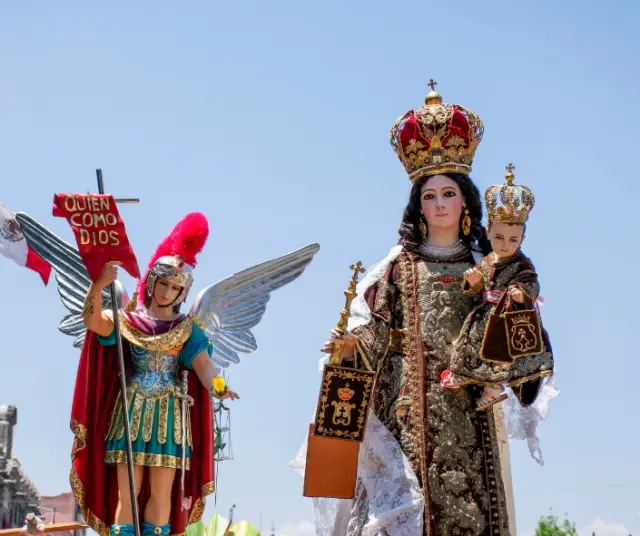The Festival of the Virgin of Carmen in Chile is an event of great importance that merges the religious and the cultural in a unique and significant celebration for millions of people throughout the country. Devotion to the Virgin of Carmen has become deeply rooted in Chilean history and identity, becoming a manifestation of faith that transcends religious barriers and becomes a cultural phenomenon shared by people of all ages and social classes.
Origins and Meaning of the Devotion to the Virgin of Carmen
The origins and deep meaning of devotion to the Virgin of Carmen date back to the first years of Spanish colonization in Latin America. The Virgen del Carmen, venerated as the patron saint of the Carmelite Order, has played an essential role in Catholic spirituality since the 13th century. The story goes that the Virgin appeared on Mount Carmel, giving the scapular to Simón Stock, leader of the order, symbolizing her protection and commitment to those who carry this sacred object with them.
In the Chilean context, devotion to the Virgin of Carmen took root particularly in the 18th century, when the Spanish colony sought to strengthen its religious ties. The construction of chapels and sanctuaries dedicated to the Virgin multiplied, establishing her presence in daily life and consolidating her role as a heavenly mediator.
Devotion to the Virgin of Carmen in Chile is not only an expression of faith, but also a cultural phenomenon that has permeated various aspects of life. The Virgin of Carmen has become a symbol of hope and protection, invoked in times of difficulty and celebrated in times of joy.
Its connection with the Carmelite Order has given rise to a series of traditions and rituals that have been passed down from generation to generation. The scapular, in particular, has acquired a special meaning, being considered an amulet of protection and a spiritual bond between the faithful and the Virgin.
The Celebration in Different Regions of Chile
The celebration of the Festival of the Virgin of Carmen in Chile acquires unique and distinctive nuances in each of its regions, reflecting the cultural and geographical diversity of the country. From the arid north to the leafy south, devotion to the Virgin is manifested through deep-rooted traditions and celebrations that have evolved over time.
In northern Chile, the holiday is characterized by colorful and vibrant processions that wind through the streets, attracting the faithful and the curious alike. The contrast between the arid landscape and the exuberance of the festivities creates a unique visual experience. Folk dances, traditional music and native rituals are intertwined with Catholic devotion, showing the influence of local culture on the celebration.
In the center of the country, the Festival of the Virgin of Carmen takes on a more solemn tone, with masses and religious events that attract devotees from all over the region. Processions in these areas often have the active participation of local communities, who contribute with their fervor and dedication to the Virgin. Traditional costumes and typical music highlight the cultural identity of each place.
In southern Chile, the festival merges with the rich heritage of Mapuche culture. Devotion to the Virgin of Carmen is intertwined with elements of indigenous beliefs, creating a unique celebration that reflects the cultural diversity of the country. Rituals that incorporate the Mapuche worldview, traditional dances and the active participation of the local community are distinctive aspects of the celebration in this region.
Associated Rituals and Traditions
The Festival of the Virgin of Carmen in Chile is full of rituals and traditions rooted in popular culture. One of the most emblematic elements is the procession, where an image of the Virgin is carried on the shoulders of devotees through the streets, accompanied by prayers and songs.
Another central aspect of the celebration is the performance of folk dances. Local groups practice traditional choreographies that represent devotion and gratitude to the Virgin of Carmen. These dances are artistic expressions that have evolved over time, fusing religious and cultural elements into a unique manifestation of identity.
Cultural and Social Impact
The Festival of the Virgin of Carmen not only has a religious meaning, but also plays a crucial role in the social and cultural cohesion of Chilean society. Participation in celebrations transcends social and economic divisions, creating a sense of unity and belonging among communities. Furthermore, the holiday has been recognized as part of Chile's intangible cultural heritage, highlighting its importance in the preservation of traditions and national identity. The influence of the Virgin of Carmen extends to music, art and literature, enriching the cultural expression of the country.
Challenges and Changes in the Celebration
Over the years, the Virgen del Carmen Festival has undergone significant changes in response to social and cultural challenges. Globalization, secularization and the diversification of beliefs have influenced the way the holiday is experienced in contemporary society.
Some communities have sought to adapt the celebration to make it more inclusive and in line with modern values. Others, however, have chosen to preserve centuries-old traditions, resisting outside influences and clinging to a more conservative form of devotion.
As the holiday continues to adapt to cultural and social changes, it remains a reminder of Chile's rich history and diversity. The Virgin of Carmen, with her compassionate gaze, continues to be a beacon of hope and unity in a country that finds in her devotion an inexhaustible source of spiritual and cultural strength.
